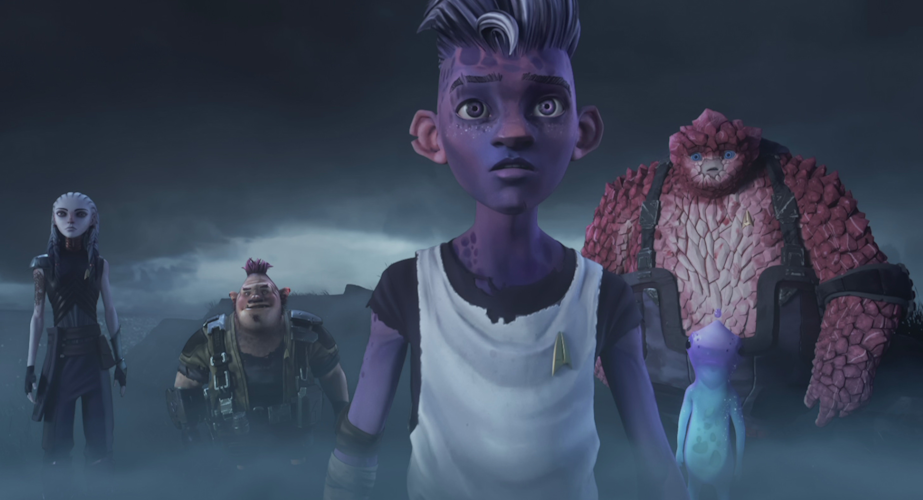If you haven’t already heard the news, then I’m sorry to report that Star Trek: Prodigy has been cancelled. The second season of the animated series is almost complete, but won’t be shown on Paramount Plus. If Paramount can’t line up another network to broadcast it – and on past form, they may not try very hard – then it’s not outside the realm of possibility that we won’t see it at all. Let’s talk about Prodigy and the absolutely pathetic decision-making at Paramount that led us here.
I’ve been ringing alarm bells about Prodigy’s prospects since before the show even aired a single episode. There were several big hurdles that got in the way of Prodigy, and all of them are entirely Paramount’s fault. The first was the choice of platform: Paramount Plus simply isn’t a streaming service with a lot of content made for kids. As such, it isn’t a platform that many kids or young people would have had access to, limiting Prodigy’s potential audience long before the show was even broadcast.

Considering that Prodigy is a co-production between CBS and kids’ broadcaster Nickelodeon – both of which are wholly owned by Paramount – this never made any sense to me. Nickelodeon was the perfect home for Prodigy, and the series could have joined a decent lineup of shows aimed at a younger audience. It wasn’t until almost a year after Prodigy premiered that the series debuted on Nickelodeon. Paramount Plus simply isn’t a big enough streaming service, nor one with much appeal to a younger audience, meaning the choice of platform was a weight around Prodigy’s neck from day one.
Then we have some absolutely appalling scheduling. Prodigy debuted in October 2021 with a feature-length premiere. But after that, only three more episodes would be broadcast before the show took a seven-week break. There wasn’t enough time for Prodigy to gain traction with its audience – and especially with a younger audience – before it simply disappeared. Paramount has fucked up the scheduling of Star Trek in general, but Prodigy’s messy launch is perhaps the corporation’s single most egregious scheduling mistake.

After its hiatus, Prodigy again only premiered five new episodes before taking an extended break – this time from February 2022 all the way to October. If any kids were still watching at that point… well, they were unlikely to stick around for eight months while the show disappeared. The second half of Season 1 ran from October through to December 2022, and was the only time where Prodigy actually got a decent run of episodes.
By the time the show returned from its extended break, though, it seemed pretty obvious that the only people watching were hard-core Trekkies and a few of their kids.

Prodigy was cut off from an international audience from the start, with no effort made to broadcast the show outside of the United States. Even in the few places where Paramount Plus existed, episodes of Prodigy weren’t always shown. In Australia, for instance, paying subscribers to Paramount Plus didn’t get to watch Prodigy in full at the same time as American subscribers.
In the rest of the world, including here in the UK, things were even bleaker. Despite the Nickelodeon channel existing in some form in more than 100 countries and territories around the world, Paramount stupidly stuck to its “America First” fetish, only showing Prodigy on Paramount Plus in the United States and ignoring all messages and requests from fans.

This approach will never work. In the 2020s, the internet and social media are one massive worldwide audience. Cutting off more than 90% of the world from a new television show is a catastrophic decision. It means that the hype bubble collapses, there are far fewer conversations on social media, hashtags don’t trend, posts don’t get likes, advertisements don’t get noticed – and then no one turns up to watch. This impacts the show in the United States – and it’s what happened with Prodigy.
Because Prodigy was on an obscure second-rate streaming platform, one that had no reputation with audiences as being a platform for kids’ shows and children’s content, because it was cut off from a worldwide audience and got precious little attention and chatter online, and because it was scheduled in such an appalling, idiotic manner, there was never any hope for the series. The only surprise here is that Paramount dragged it out this long.

The lack of toys and tie-in merchandise was just another nail in Prodigy’s coffin. The way kids – especially younger kids – engage with any property is through imaginative play. Star Trek toys would have kept Prodigy alive in the minds of its young fans in between episodes – and during the aforementioned breaks in the schedule. Furthermore, seeing toys being played with by friends or even just on shelves at the local toy shop would have inspired at least some kids to seek out Prodigy and give it a try for themselves.
I’ve shared this story before, but one of my earliest Star Trek memories isn’t an episode or a film, it’s a toy phaser. When I was perhaps as young as seven or eight, I remember seeing my uncle – who boasted an impressive collection of nerdy merch – showing me a phaser pistol from Star Trek. Before I’d even watched a single episode, I remember being intrigued by the phaser pistol and having fun pushing its button, watching it light up and make a noise.

Prodigy must be the only kids’ show in the world in 2023 to have had no tie-in products associated with it for the entirety of its first season. The lack of merchandise didn’t just prevent kids who were already fans of the show from having something to play with, it actively harmed Prodigy’s prospects and is another factor in its failure.
The truth is that Paramount didn’t give Prodigy a fair chance. Despite having so many opportunities to make this show a success, Paramount’s leadership has once again demonstrated that it isn’t fit for purpose. 20th Century thinking is trying – and desperately failing – to lead the corporation into the 21st Century, but the media landscape has shifted so much that these people don’t know what they’re doing. Prodigy’s cancellation follows Discovery’s a few months ago – and despite promises of new content, things don’t look good for either the Star Trek franchise or Paramount Plus.

Prodigy had the potential to open up Star Trek to a new, younger audience. The only way the franchise can survive long-term is to bring new, younger fans on board. If Star Trek remains the nostalgic preserve of people like me, it won’t survive – and it won’t deserve to. It’s bitterly disappointing that the series didn’t achieve that objective… but it’s even more disappointing that its failure is entirely the fault of pathetic decision-making by Paramount leadership.
It’s imperative that Paramount learns the right lessons from this clusterfuck. It would be easy to say “let’s never make another kids’ show,” but that would be absolutely the wrong way to react. Prodigy didn’t fail because it was aimed at kids – it failed because Paramount had no idea what to do with it. Scheduling, the choice of platform, the lack of toys, failure to make use of existing child-friendly channels, the lack of an international broadcast… all of these factors contributed. And the blame for all of them lies at the door of Paramount’s board and executives.

There were story issues in Prodigy, too, which may have been a factor. The show leaned heavily on the legacy of Voyager – and not just because of the inclusion of Captain Janeway. Prodigy’s story was, in many ways, a Voyager sequel, and it introduced characters and story threads that may have been too complicated or convoluted for a young audience who were unfamiliar with older iterations of Star Trek. That’s a creative decision, and one that I enjoyed – but I’ve been a Trekkie for more than thirty years. I watched Voyager when it aired, I bought the whole series on DVD, and I’ve watched most episodes more times than I can count.
Maybe, in retrospect, we’ll have to call into question the decision to have Prodigy rely on Voyager to such an extent. Maybe it would have been better to allow the show more freedom and to have it stand on its own two feet. Might that have harmed Prodigy with some Trekkies? I suppose so… but it could have opened it up to a new audience, and wasn’t that supposed to be the point?

At the end of the day, though, this is Paramount’s fault – there’s no two ways about it. Decisions taken by executives at the top cut off Prodigy from the very audience it was supposed to attract, and the show simply never found a foothold outside of existing Trekkies and a few of their kids. With no international audience, with episodes shown in short, random batches on an obscure streaming platform, and with no toys or merchandise… there was no hope for Prodigy.
A Star Trek kids’ show was a brilliant idea. And Prodigy had some wonderful voice acting, stellar animation work, and some engaging, emotional storytelling. But it was sabotaged so thoroughly by the idiots at Paramount that one would be forgiven for thinking their actions were deliberate. Surely no group of executives with dreams of running a media corporation could be so utterly, irredeemably stupid… right? But that’s the reality of working with Paramount, I guess.

Paramount needs a good clear-out. Failed leaders need to be ousted and the corporation’s attitude adjusted. Priorities need to be re-examined, and the long-term future of streaming needs to be urgently addressed. Paramount Plus is losing money by the boatload – and that seems unlikely to change in the short-term. Will it survive the decade? Will it last until Star Trek’s 60th anniversary in 2026? Will it still be here at Christmas?
Make no mistake, Prodigy won’t be the only casualty here. Unless and until Paramount can get its act together, these failures will continue to happen. With two of Star Trek’s five shows being cancelled within months of each other, and with Paramount Plus continuing to flop around like a dying fish, fears for the franchise’s longer-term prospects – and the prospects of shows like Strange New Worlds, which is currently paused due to an ongoing writers’ strike – only grow. I wish I had confidence in Paramount’s leadership to steady the ship and sort things out.
The Star Trek franchise – including all properties discussed above – is the copyright of Paramount Global. This article contains the thoughts and opinions of one person only and is not intended to cause any offence.

